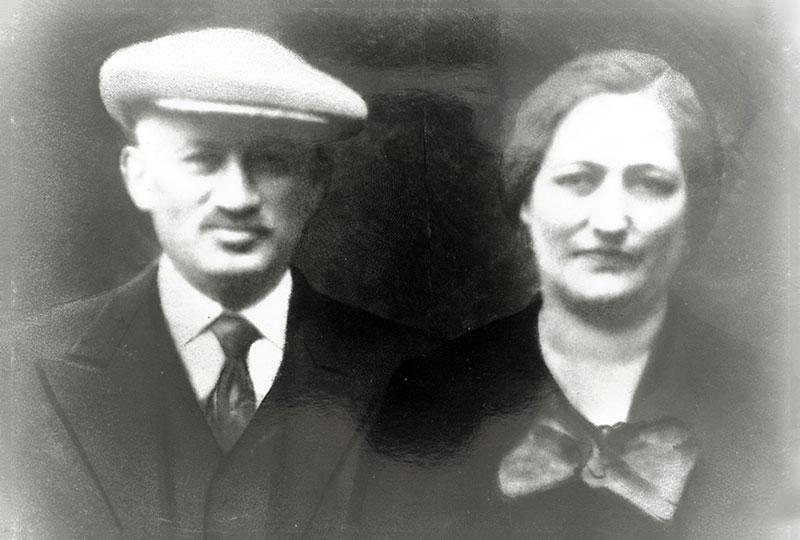

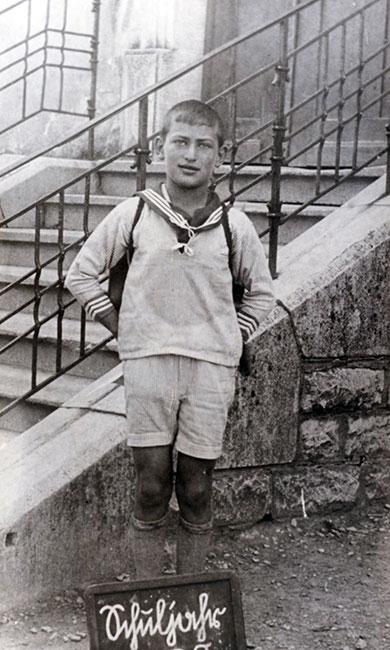

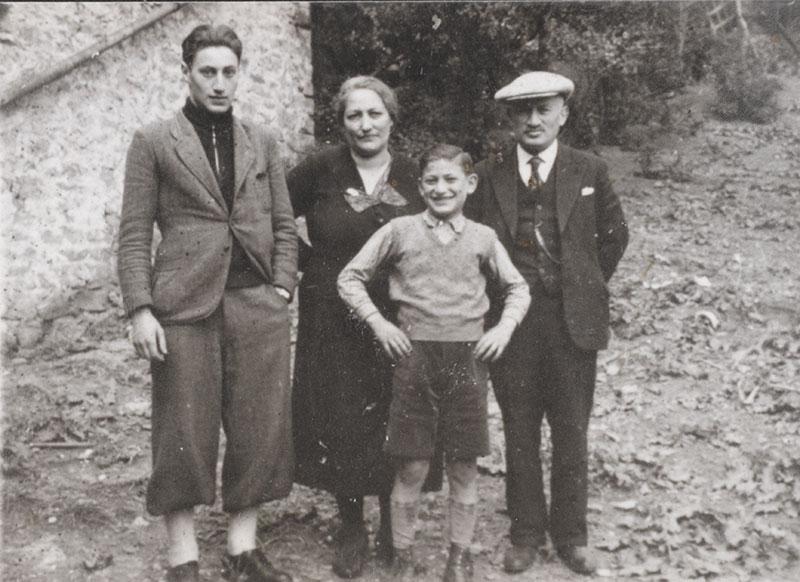

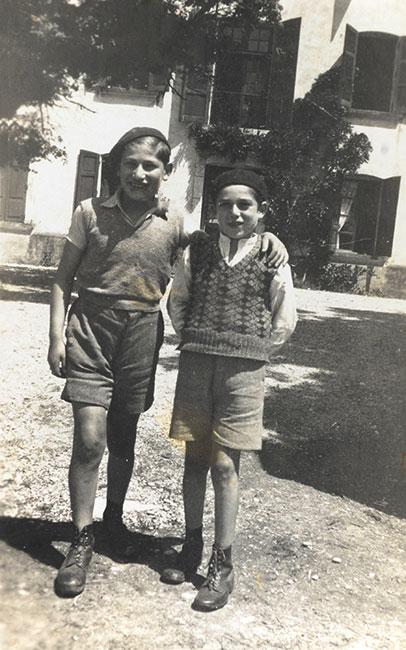

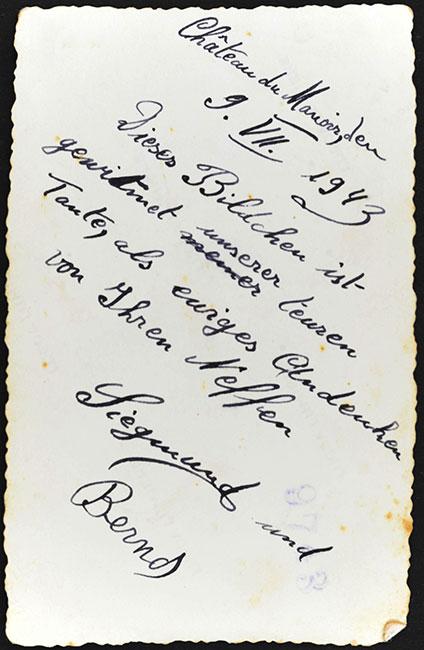

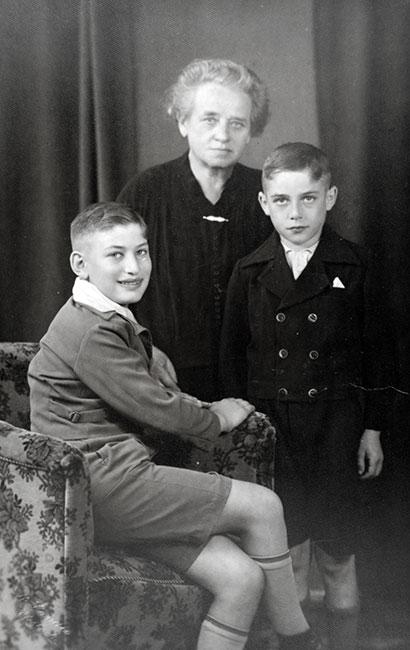

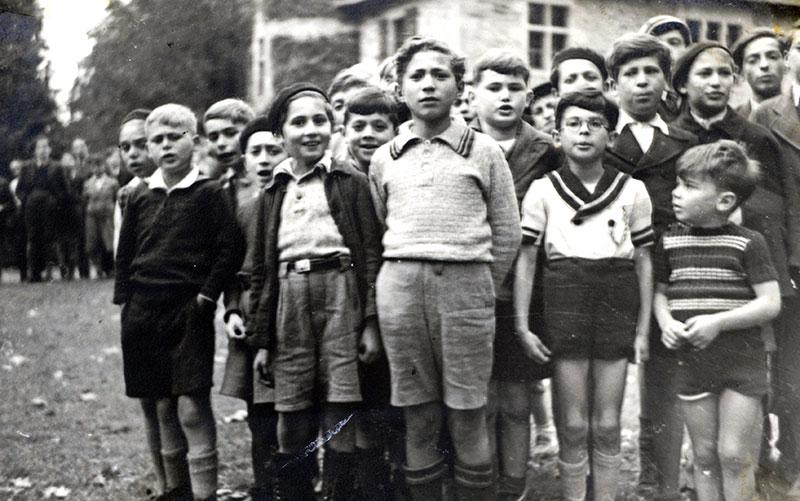

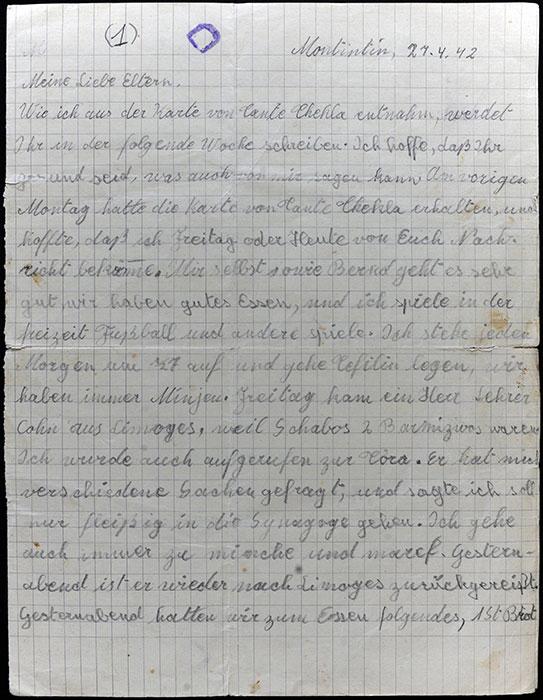

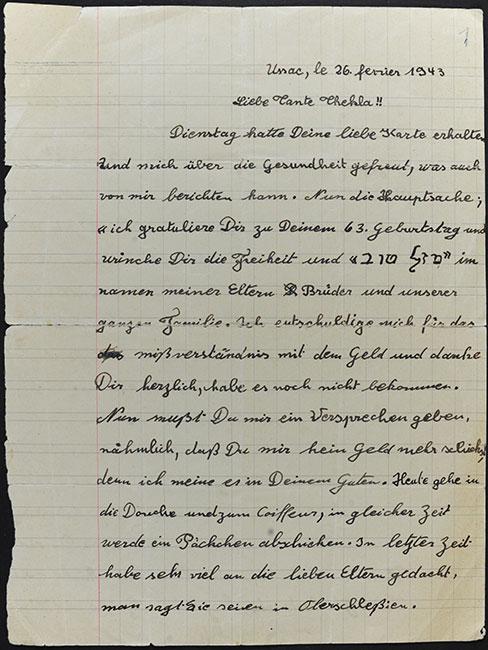

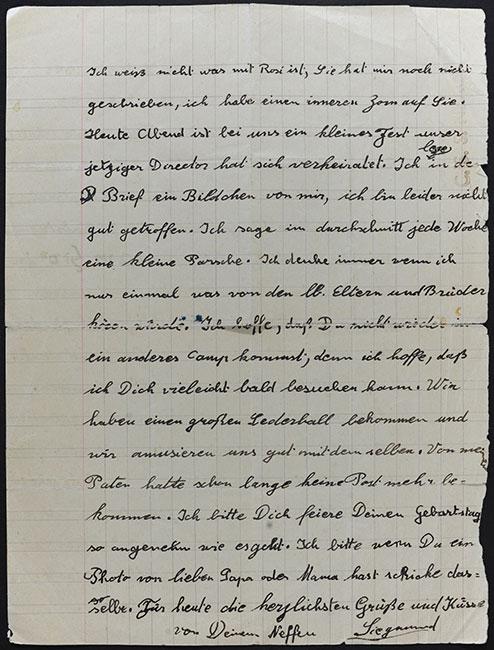

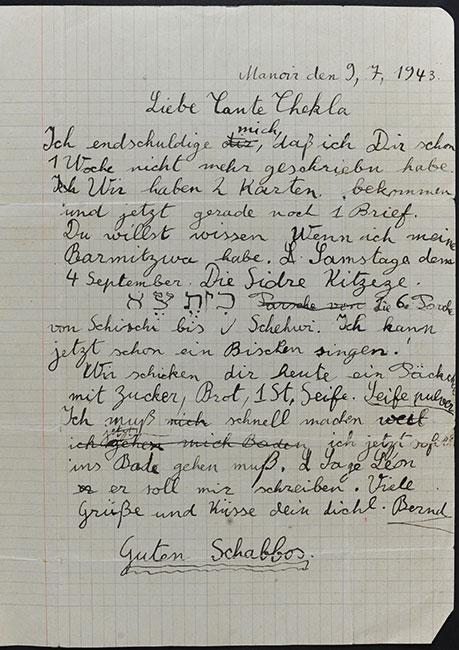

Sunday to Thursday: 09:00-17:00
Fridays and Holiday eves: 09:00-14:00
Yad Vashem is closed on Saturdays and all Jewish Holidays.
Entrance to the Holocaust History Museum is not permitted for children under the age of 10. Babies in strollers or carriers will not be permitted to enter.






















26 February 1943
I think a lot about my beloved parents and I miss my childhood years.
I don’t know what has happened to Mother. She doesn’t write to me. I’m angry with her.
…
I think about my parents and brother all the time and I want to be with them.
…
I ask that you celebrate your birthday as well as you can. If possible, please send me a photo of Mother or Father.
Your loving nephew,
Ziegmond
From Ziegmond (Shmuel) Kaufman’s letter to his uncle, February 1943
Shmuel (Ziegmond) Kaufman was born in 1929 in Baiertal, in the Baden region of Germany. He was the youngest of Rosa and Cezar Kaufman’s three sons. Ziegmond attended the primary school in the neighboring town of Weissloch until 1938, when Jewish children were expelled from German schools and he was forced to move to a Jewish school in distant Heidelberg. Both of Zeigmond’s brothers left Germany a short while before the war broke out. Bertold, aged 17, was sent to England on the Kindertransport and Joseph (Zepel) aged 15, managed to reach Denmark and from there immigrated to Eretz Israel.
In October 1940, the Jews of Baiertal were deported to the Gurs concentration camp in southern France. The Kaufman family was among the deportees: Ziegmond and his parents, Ziegmond’s aunt Tekla (his father Cezar’s sister), his uncle Joseph (his father’s brother), his wife Hänschen (Chana) and their son Bernd. In Gurs, the men were kept apart from the women and children. The family managed to maintain contact with each other via notes and letters. Rosa and Cezar even received a letter from their son Joseph (Zepel) in which he informed them that he had reached Eretz Israel and with which he enclosed a number of photographs of himself.
On 24 April 1941, Cezar wrote to Mrs. Ackerman, who had been with his son Joseph in Denmark and knew the family that had hosted him there:
On Friday, the seventh day of Passover, we received the letter with the wonderful contents and four photographs. With tears in our eyes, we read and looked at the pictures all day long.
You can’t imagine how much happiness this has brought us, because we are in a very difficult period and suffering greatly. We are happy and grateful to God that our son has reached his destination from Denmark.
We thank you very much for your involvement. God will repay you… Joseph looks well in the photographs.
In June 1941, after eight months of incarceration in Gurs, Ziegmond and his parents, his aunt and uncle Joseph and Hänschen, and his cousin Bernd were sent to Rivesaltes, a camp near the city of Perpignan in France. Tekla, his father’s sister, remained in Gurs. Rivesaltes too had separate blocks for men and women. Ziegmond and Bernd were sent to the men’s blocks together with Cezar and Joseph.
Ziegmond turned thirteen in February 1942. Despite their imprisonment in the camp and the difficult conditions, Ziegmond’s parents, aunt and uncle found a way to mark his Bar Mitzvah and he was even called up to read from the Torah. These turned out to be Ziegmond’s final moments with his parents. A short while later the OSE moved Ziegmond and his cousin Bernd to Château de Montintin, an old castle near Limoges that was concealed by the surrounding woods.
From Bernd’s letter to his parents from Château de Montintin:
27 April 1942, Montintin
Dear Parents,
I hope that you are healthy; I am.
We haven’t received even a single letter from you.
…
I greet you dear Father and Cezar and really hope that this letter will reach you.
Dear Parents, they fixed our shoes without payment, we didn’t need to pay the cobbler for the shoes.
We play whenever we don’t have school.
…
Do you still make pea soup from the leftovers in the kitchen at the end of the day?
I have a new pencil. I’m not forgetting to pray. I pray all the time.
On Shabbat we went to the synagogue in the castle. During the Friday night meal we had an “Oneg Shabbat” (Sabbath celebration). There are three people who play with us and time flies…
This morning we ate bread and butter with coffee. For lunch we have vegetable soup, a large potato and sometimes meat. We have kitchen duty every week; I don’t like it so much. We have school from 8 AM till 2:30 PM and then we have lunch.
I have to end for today because I have to go and pray.
Kisses,
Bernd
Ziegmond added a postscript to his parents:
From the letter that I received from Aunt Tekla I understand that you are going to write to me next week.
I hope that you are healthy, I am.
Last Monday I received the letter from Aunt Tekla and I hope that today or on Friday I will receive news from you. Bernd and I are doing very well. We have good food and I play football and other games in my free time. I get up every morning at 6:30 in order to pray with tefillin (phylacteries) and we always have a minyan (prayer quorum) .
…
Dear Father and Uncle Joseph, happy birthday again.
Assuming that the letter arrives. I need money to send the letter. When you write to me, please enclose some money with your letter.
…
Wish Aunt Tekla all the best. I was very happy to receive her letter and I have taken her words to heart.
For today, lots of hugs and kisses,
Your loving son,
Ziegmond
That year, Ziegmond’s parents were sent from Rivesaltes to the Drancy transit camp. In the final letter that was received from them, Rosa and Cezar wrote to Tekla:
We want to write a few words to you before Shabbat. We hope that you are well. We have also become accustomed to the difficult situation. There is always something else that makes us hysterical. They are sending people "There".
On Monday they are opening a kitchen here, so we are hoping that they won’t send us so soon. We need to rely on God.
Wishing you good health and all the best, Cezar and Rosa Kaufman
Cezar added to his wife’s words:
First of all, I ask for your forgiveness for my behaviour, although it was unintentional and a result of the stressful situation that we were in. Please be in contact with us. You need to nurture the connection with the children.
Thank you for everything. We hope that you will be well.
I wish you all the best if we do not see each other again,
Your faithful brother,
Cezar
The letter was apparently written in June 1942. On 14 August 1942, Cezar and Rosa were deported from Drancy to Auschwitz, where they were murdered.
On 22 November 1942, Ziegmond, Bernd and three other children were transferred to a hiding place in Moissac by Limoges.
26 February 1943, Moissac
Dear Aunt Tekla,
…
I am happy to hear that you are well; I am also well. Now to the main issue: I want to wish you a happy sixty-third birthday. I wish you freedom on behalf of my parents and the whole family.
I think a lot about my beloved parents and I miss my childhood years.
…
I don’t know what happened to Mother.She doesn’t write to me. I’m angry with her.
…
I think about my parents and brothers all the time and wish that I could be with them. I hope that they don’t transfer you to another camp because I want to visit you one day. We have received a football that someone made from leather. We are enjoying playing with it. I haven’t received any mail in ages.
…
I ask that you celebrate your birthday as well as you can. If possible, please send me a photo of Mother or Father.
Your loving nephew,
Ziegmond.
In early April 1943, Ziegmond and Bernd were transferred to Château du Manoir in Saint Etienne de Crossey near Grenoble. They continued writing to their aunt, sending her packages and asking after their parents, who were no longer alive.
9/7/1943 Manoir
Dear Aunt Tekla,
I apologize that I haven’t written to you in over a week. My Bar Mitzvah will be on the 4th of September when I will read the sixth and seventh sections of the Torah portion of Ki Tetze. I can sing a little.
We are sending you sugar, bread, a piece of soap and some laundry powder today.
…
Lots of hugs and kisses,
Bernd
Shabbat Shalom
9/7, Château du Manoir
Dear Aunt Tekla!!
This week I received two postcards that made me happy. My health is similar to yours. I hope that you received the last parcel that I sent you. Tomorrow I will send another that will contain fourteen slices of bread, twenty cubes of sugar and the rest... I don’t know what I will add. I’m learning all the time and I have a lot of work. The pictures that I will put into the package were taken in front of our house. Bernd’s shirt doesn’t fit him so he looks a bit funny in the photo.
Now it is time to go to sleep.
I miss you and send you kisses,
Ziegmond
The OSE provided the two youths with forged French identity papers, and together with three others they were transferred by train to Axelberg, by the border with Switzerland. A member of the French Resistance waited for them there and took them across the border. Ziegmond protected his younger cousin Bernd throughout their time in hiding.
After crossing the border, the two were taken to an internment camp. In October 1944 they were sent to a Jewish institution near Lausanne. At the end of the war, the head of the institution informed them that their parents had not survived. Ziegmond and Bernd immigrated to Eretz Israel (Mandatory Palestine) in 1946. Ziegmond married Rachel née Altowski and they had three children. Ziegmond died at the age of 42.
The letters and photographs were donated to Yad Vashem by Ziegmond’s son, Roni Kaufman. They reveal the perspective of two youngsters, Ziegmond and his cousin Bernd, who were deported from their home and their birthplace, imprisoned in camps and from there smuggled to hiding places, having to separate from their parents, their families and all that they were familiar with. They express their longings and the uncertainty in which they were trapped, and describe daily life in hiding places: what they were were doing, and how their thoughts were always occupied with their parents’ fate, their longing to hear from them and be reunited, and their wish to fulfil their parents’ request - adherence to family and religious traditions, and upholding their Jewish heritage.
Shir Kaufman conducted research on his grandfather Ziegmond and his family during the Holocaust, based upon these letters and photographs together with documents and testimonies from various archives. He wrote a book based upon his research, published under the title Big Brother.

Thank you for registering to receive information from Yad Vashem.
You will receive periodic updates regarding recent events, publications and new initiatives.

"The work of Yad Vashem is critical and necessary to remind the world of the consequences of hate"
Paul Daly
#GivingTuesday
Donate to Educate Against Hate


Worldwide antisemitism is on the rise.
At Yad Vashem, we strive to make the world a better place by combating antisemitism through teacher training, international lectures and workshops and online courses.
We need you to partner with us in this vital mission to #EducateAgainstHate
The good news:
The Yad Vashem website had recently undergone a major upgrade!
The less good news:
The page you are looking for has apparently been moved.
We are therefore redirecting you to what we hope will be a useful landing page.
For any questions/clarifications/problems, please contact: webmaster@yadvashem.org.il
Press the X button to continue



